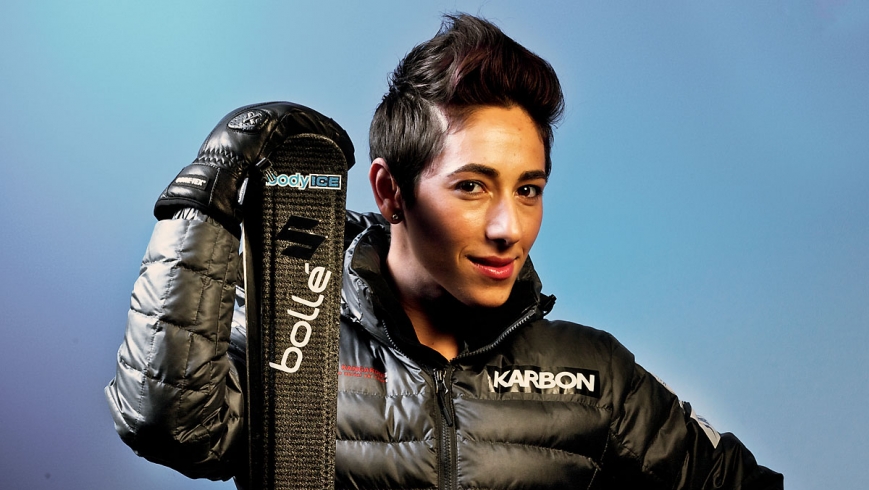“I’m generally pretty fired up, so I need to bring myself down,” says Australia’s defending Olympic aerial skiing champion Lydia Lassila.
“For me, it’s more of a challenge to stay calm, stay chilled out.”
Lassila is providing an insight into the silent minutes before a jump when she likes to visualise herself pulling it off.
In 2010, the freestyle skier became a household name when she claimed gold at the Vancouver Winter Olympics in Canada. Four years on, the prospect of becoming a legend at next month’s Winter Olympics in Sochi, Russia, is looming with Lassila hoping to bag back-to-back gold medals in the snow.
If successful, she will create history, becoming Australia’s first dual Winter Olympics gold medallist.
Lassila grew up in Sunshine and began her sporting career as a gymnast at the Footscray City Gymnastics Club. When she was 12, her family moved to Diggers Rest and gymnastics became more than a pastime.
She competed at the Niddrie Gymnastics Club and then moved into elite gymnastics at Methodist Ladies’ College in Kew. She finished high school at MLC, making the daily commute from Diggers Rest.
By year 12, Lassila was coaching gymnastics and it was then she was quizzed about giving aerial skiing a go.
“I hadn’t skied before and had no idea about it,” she recalls. “They reeled me in by saying, ‘You might have a chance of going to an Olympics.’
“It was the carrot dangling for me. I thought the worst that could happen is that you learn how to ski,” she jokes. In fact, Lassila did spend 1999 learning to ski, with her skills as a gymnast helping her pick up the techniques easily.
A year later she was jumping and was hooked.
The rapid rise continued and culminated with her competing at her first Olympics in February, 2002, in Salt Lake City. Less than a decade later – Vancouver, 2010 – Lassila became an Olympic champion.
Her latest Olympic bid is now in full swing.
In Switzerland last year, Lassila undertook gruelling challenges to perfect a new routine that she hopes will lift her to glory.
The quadruple-twisting triple somersault, which adds an extra twist to the routine that won her gold in Vancouver four years ago, has never been successfully completed by a woman on snow.
Understandably, training for the attempt has been physically and mentally draining. In the summer off-season, she practised every day on an artificial surface, taking off a jump and landing in a pool.
She gradually built her skills, from single flips to double, then added twists and triple flips with twists.
The process was repeated for days and weeks on end until it was clear in her head and she was confident enough to nail it on snow.
“There’s a lot of impact on your body. It’s mentally draining to do this for six months. The harder the skill, the more difficult it gets mentally.”
With mental preparation an important factor in her performance, a key component of Lassila’s preparation occurs away from the slopes.
She employs sports hypnotist Jeffrey Hodges to increase her mental toughness and help her let go of any lingering negative experiences.
“We work on different skills, like relaxation, visualisation, or anchoring a positive experience or letting go of a bad one,” she says.
At home in her downtime, Lassila finds yoga the best way of recharging her batteries.
But she’s not home much. With no training facility in Australia, she’s forced to spend the summer off-season abroad, away from the home in Flemington she shares with her husband Lauri and two-and-a-half-year-old son Kai.
“Sometimes I can take Kai away with me. He travels with me and my mum, but then my husband is without Kai,” she laments.
“So then my mum would fly him back and
I would be without Kai. I can function, but I hold a lot of anxiety and it’s heartbreaking to leave him.” Lassila is unsure whether she will push on after the Winter Olympics. “I’m going to leave that decision for 10 seconds after the final to see what sort of feeling I get.”
Post Vancouver, she recalls thinking that if she won she’d have been satisfied given the roller coaster ride she’d been on.
“I thought I would get that feeling, but I got the opposite. I felt that I had more in me. So I’m waiting for that moment again.”
The 32-year-old has been long campaigning for an Australian water ramp training facility and her decision about continuing in the sport will depend heavily on getting one. A new facility would mean less travel and more time at home with family. But in the end, she says, the sacrifices are worth it and she owes a lot to sport.
“It’s built me; it’s who I am. It’s stripped me bare and I’ve built myself up again and I can use that, and share that,” she says. “In any world – corporate or sporting or a ‘mum’ world – you have days when you need motivation. You need to pick yourself up and that’s what sport has taught me.”
Lassila says she’s heading into the Sochi Games feeling well prepared.
There is an air of added anticipation, excitement and pressure as the defending champion, and she describes it as both frightening and exciting. “My body feels great, and I need to stay calm and keep it all together for the day.”
The mechanics and aesthetics of jumping is what Lassila says she loves most, but it’s the adrenalin and fear it creates that keeps her coming back.
“You’re always on the edge, riding that fine line and that’s what I love about it – but also hate about it. A lot of variables can affect you. You need to constantly adjust yourself. You have to be ready for anything.”








